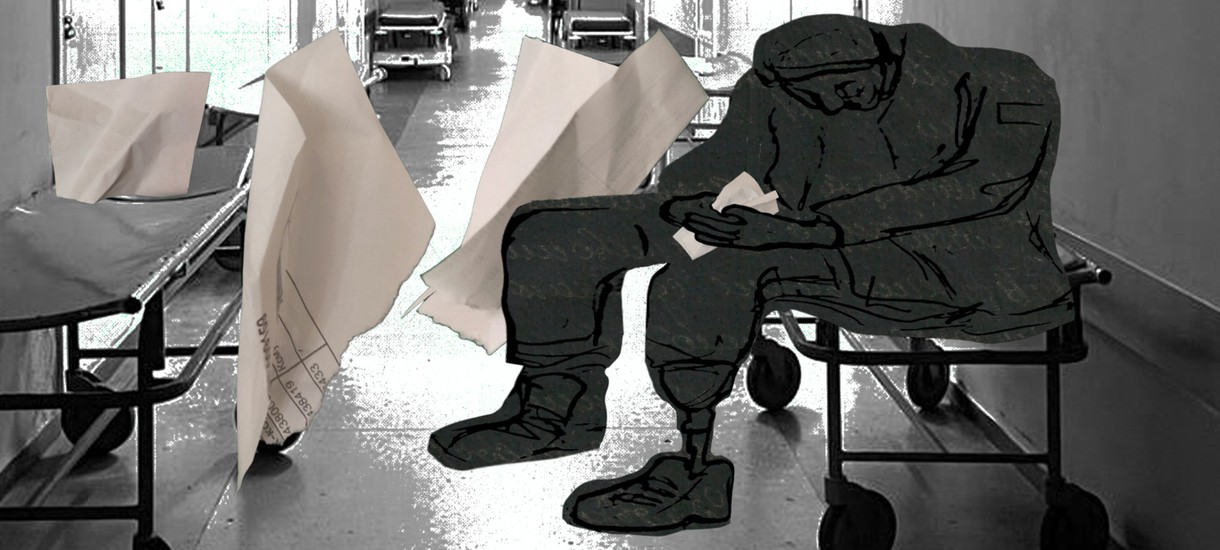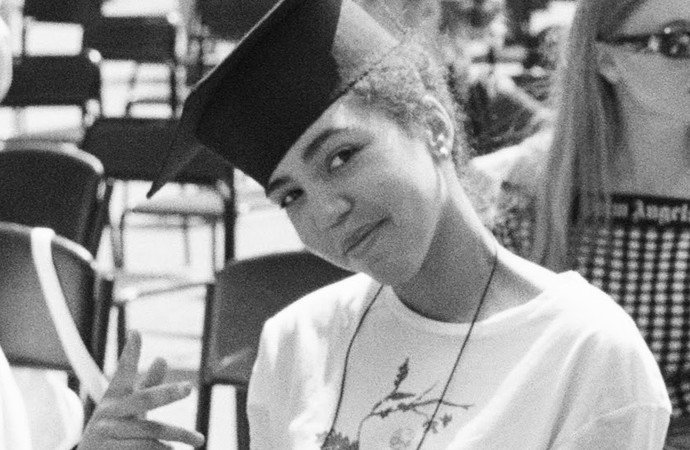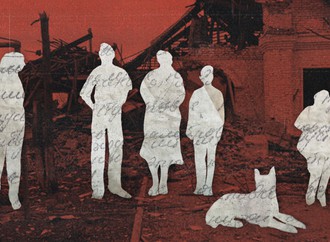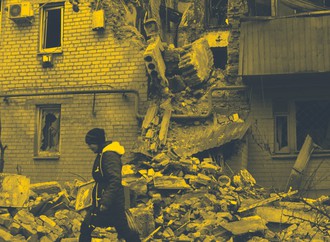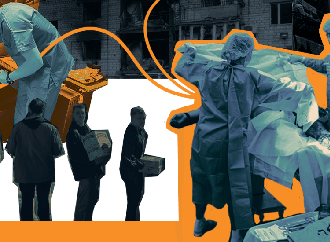“Perfect society is when there is respect for one another, no matter whether I have an injury or not, whether I served or not. You should help if you see that someone has it hard, or just come and help anyone, no matter if the person has a prosthesis or not,” - Andriy.
In the conditions of a full-scale Russian invasion of Ukraine, the number of people with disabilities grows rapidly both among soldiers and civilians. That’s why updating and improving current legislation concerning medical, legal, labor, and daily aspects of the lives of people with disabilities is urgent. Despite that, the unreadiness of both society and the state to adapt to the new reality, to simplify and reform the institutions, is evident.
We spoke to veterans to find out the most pressing needs of the people who got disabilities due to the war. The research this material is based on doesn’t cover the experiences of all veterans but indicates the present tendencies, problems, and spheres that need improvement.
Informants for the research
Maria, 23 years. Volunteer combat medic since 2016, a combat medic in the Territorial Community Volunteer Formation (TCVF) since 2022. Was first injured in 2016 - a spine fracture. In 2022, she had a bone fracture, contusion, and shrapnel wounds in the pelvis and legs. Didn’t register the disability status.
Dmytro, 24 years. Commander of one of the UAF’s reconnaissance units. He had 9 gunshot wounds (in his limbs and head, both his legs and an elbow were shot through). He wore the external fixation devices on both legs and an arm. Was declared medically unfit for the service.
Andriy, 26 years, commander of a mortar group in a volunteer battalion, got both of his legs amputated.
Roman, 22 years. Served as a conscript in 2019, and by contract in 2022 as part of the UAF. Amputation of one leg.
Bohdan, 56 years, served as a conscript in Soviet times. Voluntarily registered in the military draftee office and was mobilized in 2014, participated in the Anti-terrorist operation (ATO) as part of an airborne assault brigade. Got his right arm and left wrist amputated, lost sight in the right eye, and had a head injury. Was found medically unfit for the service.
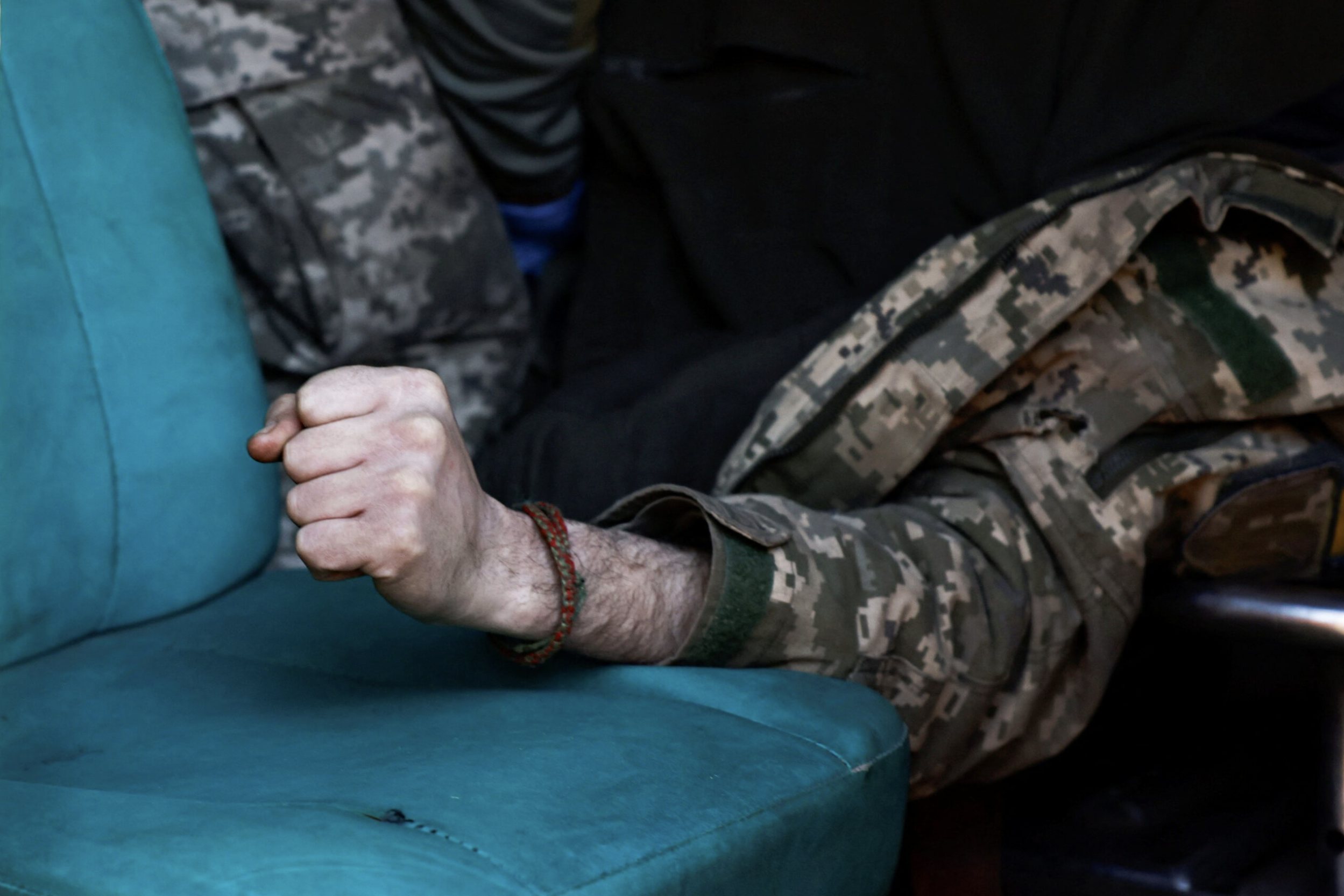
A wounded Ukrainian soldier in an ambulance on the front line near the front-line city of Kreminna, Ukraine, on March 13, 2023. Photo: REUTERS / Violeta Santos Moura
Medical help for the veterans: providing decent care and treatment
People, officially registered within the UAF, receive an official salary, and have access to state insurance, medical and legal (paperwork, passing commissions) help, reintegration programs, and pensions. Yet, despite their similar status, their level of access to governmental and social services often varies.
Dmytro notes that he didn’t have any problems while passing various commissions. He also had access to government aid with treatment, rehabilitation, and prosthetics:
“First, I was treated for free in a military hospital because I’m a soldier. I was also offered a program - to go for treatment to Italy, but I declined at the time due to personal reasons. But I had comrades in a hospital, and they were taken for treatment to Germany and Italy with no problem. So, the defenders are cared for.”
Dmytro has military education and officer rank which could affect his experience thanks to his previous integration into military structures.
Another participant of the research, Roman, recalls doctors’ attentiveness: “Doctors were constantly nearby, when something hurt they were at once: if you have pain let us give you some painkillers, something else.” He also had the option to get prosthetics abroad: “They called me from the Ministry of Defense, asked: “Are you interested? There is an option to stay in Ukraine to get prosthetics, or to go abroad”, I said, “Let’s go abroad.”
On the other hand, Andriy faced the negligence of medical personnel. He describes his experience of staying in one of the hospitals as the worst stage of his recovery:
“Roughly speaking, I was just rotting there, they were doing nothing, there were no painkillers, they came one day and said, “We don’t have painkillers.” And in response to the personal request to give us a prescription so we can go and buy them from our pocket, [the doctor] refused to give us a prescription, and hence there were no painkillers. Well, we just had to endure the pain.”
He assumes it has to do with the fact that the war reduced the illegal earnings of doctors because soldiers are brought to medical facilities and have to be treated for free:
“A young man was walking around there, all perfumed with some aromas, that you could come into a room with him and you could hardly breathe, he had the latest iPhone…. Shortly speaking, he was obviously there to earn, and he’s been earning quite well, and then soldiers arrive whom you need to treat for free, and that’s totally unprofitable for them.”
Such a situation might also be tied to the unpreparedness of medical personnel to work with soldiers and to overall guide the processes of rehabilitation. Another factor may be the problem of burnout and insensibility of medical personnel due to the high numbers of wounded, which indicates the need for reforms in the medical sphere, aimed both at improving the skills of personnel and providing high-quality psychological support for medical workers who work with the wounded.
These experiences show that the medical sphere has many problems at the moment. It's unable to fully cope with the challenges of the war. Attention to those problems and changes in medical care are crucial for the proper treatment and rehabilitation of the wounded.
Acquiring disability status and getting access to government insurance, treatment, and pensions, involve a bureaucratic process, which is, unfortunately, far from perfect.
Soldiers, officially registered within the UAF, are entitled to assistance with preparing the paperwork and passing relevant commissions. But this process can become very long and be accompanied by a lot of difficulties. Despite the evidence of positive experiences when soldiers receive the help they need and pass the bureaucratic procedures relatively fast, there are also negative cases when the wounded have to wait for an unacceptably long time to get help and access insurance and pension.
We should separately emphasize the “renewal of disability status” - the requirement to regularly confirm the status of a person with a disability. The process of getting through the socio-medical expert commission is outdated and creates a lot of difficulties for people with disabilities. Maria tells about this side of the story:
“It’s not my experience but it concerns me too. This government thing when you have to renew the disability status every year - it is nonsense. Most of my brothers-in-arms have a prosthesis, and they have to be checked every time to ensure what, that their leg didn’t grow back? It’s such unbelievable nonsense and I really want it to change.”
Maria is not officially registered with the UAF. It means she’s deprived of social protection and governmental help. The government can’t in any way trace such cases and provide proper protection for its citizens. Maria tells:
“I’ve never served neither in the UAF nor in Territorial Defense. I have no relation to the [official] structures or volunteers who are part of the structures. It’s always a volunteer story. I serve at my own expense. We don’t have social guarantees that, for example, contract soldiers have.”
“I was supposed to have a military ID. They just didn’t give it to me in the military office because, they said, I don’t have medical education. So they don’t register me for a couple of years now”, - she explains.
Maria is a combat medic at the frontline but because of bureaucratic loopholes, she doesn’t receive proper social protection. It concerns medical care (including psychological), social payments, rehabilitation, reintegration programs for the ex-military, but also the processes of passing the Socio-medical expert commission, receiving the disability status, etc. “It’s all done by yourself: soldier does something, volunteers are fundraising for a prosthesis. There are a lot of such stories nowadays”, Maria tells.
To afford her treatment and basic needs, she has to work. That affects the rehabilitation process too:
“I work in the service sector. It’s been really hard because my morning would start like this: I couldn’t get up until I gave myself an injection. Not as much because of the pain, I just physically couldn’t get up. And the whole day was - injections, pills, I still live like this.”
Bohdan’s experience is also somewhat different because he’s an ATO veteran. He notes that at the time medical care and prosthesis weren’t very advanced, there was much less access to the information and less knowledge about various possible solutions and options:
“There wasn’t enough information at the time: what do you need, how fast should you get medically retired to get a prosthetic. Some said, don’t rush while you’re in the Armed Forces, while you’re there you’ll be looked after and treated, plus you keep receiving a salary. On the other hand, you had to settle the issue with the prosthesis. There was no government program yet, it was just being developed at the time. As I understand, there were many offers from the volunteers.”
At the time, there was a lack of information about the whole process of getting a prosthesis, no consultations or recommendations: which types of prostheses are there, which ones suit which situations, and how the process of healing and adaptation goes. From our respondents’ accounts, it's clear that while the situation has improved now, there is still no clear and understandable instruction that could guide everyone. Besides, getting a prosthesis often demands resources that are not available for everyone, for example, money, legal support to get insurance, etc.
Psychological support
Soldiers who got a disability due to the injury, also need psychological rehabilitation. With this, respondents’ experiences vary greatly. Maria told she faced PTSD and goes through psychotherapy. She says that therapy is what helps her not to break down and come back to civilian life after the injury. That said, she notes that, instead of psychotherapy, people in some cases turn to self-medicating which can lead to alcohol or drugs addiction:
“It is a post-traumatic stress disorder. What keeps me together is therapy and pills. It’s just impossible to do without it. I know that some people drink alcohol, something else… stories like that.”
However, other participants of the research, who didn’t receive psychological help during their rehabilitation, also told about other ways of self-help. Some of them are, for example, searching for a job, acquiring new professions, self-development, creativity, and physical exercise.
“Physical exercise and interesting books distract you from bad thoughts”, Bohdan says.
Dmytro also shares his experience: “While I was in the hospital, I launched a telegram channel, wrote a book. I finished it but haven’t printed it yet. I started looking for a job while officially still in the army.”
Some people helped themselves by interacting with others and helping those with similar experiences who needed support:
“I just show by my example [how you can cope]. And I tell that you can do that too, even more so. [...] I receive a lot of messages, [questions] how to deal with something, or wives write that their husbands have pain and [...] don’t know what to do with it properly. I tell them to just show, for example, my page or something else, and that they can text me”, says Andriy.
What such experiences might tell us? First of all, they point out a need to develop military psychology. Even though not all soldiers will go into therapy and it won’t be fully helpful for everyone, it’s necessary to have enough qualified military psychologists. In that case, people will not only find the necessary support from a relevant specialist, but it will also increase the number of works, research, and methodologies for self-help, and society will have enough information about the specifics of experience, received at the war.
Besides, we need to overcome the stigma around psychotherapy and the people who go through it. Stereotypes about therapists are still widespread in society: “only whackjobs” go to them, therapists take money for “empty talking”, and “strong people” can deal with everything on their own. As a result, most people never gain enough courage to go into therapy.
“Some of my brothers-in-arms say, “you’re bonkers, talking for 1000 hryvnias per hour”, says Maria.
To provide soldiers with proper psychological support, we also need to create informational platforms about self-help and other help with reintegration. It’s also important to support initiatives, created by veterans, that would help soldiers and their families to communicate among themselves.
Social isolation
Relations with others play a major role in the rehabilitation of injured soldiers. Several respondents noted that their social circle changed profoundly after the injury.
“...Changed, let’s say, some societal circle in which I was. That’s why my thoughts changed accordingly. Because I was, like, in one social circle, and now it’s completely different”, says Andriy.
After the injury, soldiers may face a lack of understanding, unreadiness and unwillingness of people around them to listen to their stories and provide the necessary support. It might lead to feelings of isolation and the conclusion that they are on their own with their problems.
“I had some bias about other people, not enmity but distrust. I’ve always had trust issues. But after the injury, I didn't let myself get close to other people at first”, shares Maria.
Feelings of loneliness may cause an inability to share their experience with loved ones due to the unwillingness to traumatize and cause them stress.
“My family, my close ones don’t know about it. Before 2022, they didn’t even know that I was connected with the army, with the service, that I go on missions with the assault rifle, that it happens in my life”, says Maria.
So, people may shut themselves off and alienate from friends and relatives, feeling they are a burden, thinking their stories and experience will only get in the way of those around them. It's also difficult to share their feelings with people who don’t have similar experiences. In this case, interacting with other soldiers and the ability to help each other and share advice have positive effects. Andriy says:
“I show by personal example that I did it. And I say that you can do it even more so… They just see that I’m walking around and, like, actively doing something, that's why they probably realize that they can have it like that too. And I try to include them when I can.”
Stereotypes about people with disabilities, dominant in society, are also harmful. Among them is perceiving disability as incompatible with having a “quality” life, the habit of treating people with disabilities as an invisible part of society, or, to the contrary, excessive attention, staring, inappropriate questions.
“In public, when I still walked on crutches or was carried around in a wheelchair, it was a bit uncomfortable. When you’re carried in a wheelchair and everybody’s staring”, says Dmytro.
There’s also a tendency of excessive pity and paternalistic behavior toward people with disabilities.
“You shouldn’t pity warriors. Pity humiliates! You should understand warriors”, says Bohdan.
Such behavior may suppress people’s dignity and increase feelings of isolation. Society must learn to listen to the experiences of people with disabilities and treat their achievements, aspirations, plans for the future, etc with respect.
New daily life
After the injury, the everyday lives of all respondents changed profoundly. It concerned both big questions that had to do with medical needs, the necessity to change profession, changes in social circle, and daily routine things that were done automatically in their previous daily lives.
“I realized that I’ll really have to put a bit more effort to lead a normal life and do more stuff, like, around me to be more comfortable”, says Andriy.
Moving around in a city has also become much more difficult, as well as accessing places like stores, restaurants, offices, etc. Most locations, needed for daily life, are hard to access or at all inaccessible for people with disabilities.
“For example, some stores are located upstairs, so I couldn’t get into such stores”, notes Dmytro.
“And the facilities, for example, in Kremenchuk - they’re all inaccessible. To get a ramp, you have to tear with your teeth, with everything you have”, says Maria.
Besides the practical issues that include moving around the city, technical equipping of offices, etc, there’s a problem with the availability of accessible recreational spaces. Respondents noted that after injury they can’t visit places that were previously a part of their daily lives.
Life after injury
In this piece, we described real stories of soldiers that can help make a general picture. Spatial inaccessibility is a major obstacle to reintegration. Public transport, shops, offices, and streets, in general, aren’t equipped to ensure free movement for people with disabilities. Besides, stereotypical and intolerant treatment by lay people can aggravate the situation and turn any instance of going out into a potentially unpleasant experience. Another factor that complicates life is bureaucracy - the process of getting and renewal of the disability status, getting a pension, insurance, etc. In the medical sphere, there's a problem with the lack of experienced rehabilitation doctors who specialize in combat injuries.
Many veterans go through major changes in their worldviews and change their social circle after the injury. In some cases, it’s caused by a lack of understanding by the old circle and/or displays of intolerance by acquaintances. It’s important to note that even though current legislature and procedures aren’t perfect, respondents point out that generally there are positive changes in the sphere of work with people with disabilities. Among them, they note the evident progress in medical care and legislature (compared to 2014).
It's also very important to create initiatives and organizations that develop study programs aimed at reintegration of veterans and attracting attention to the topic of an inclusive society. A big part of the responsibility for reforming the legislation, city planning, social and medical spheres lies on government initiatives and authorities. That doesn’t mean that individuals don’t have any influence on what the lives of people with disabilities in our society are like. Everyone can make a positive impact even now.
